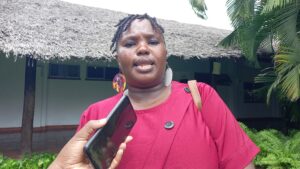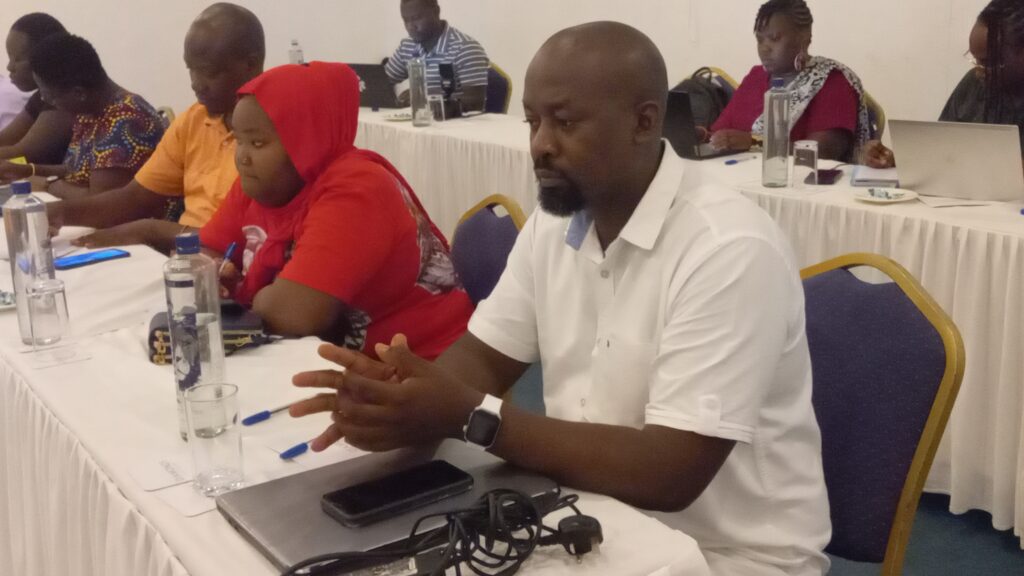BY SHABAN OMAR
The Kenya Human Rights Commission, county governments, civil society organizations (CSOs), and the Kwale Mining Affected Communities are set to petition the national government to release mineral royalties amounting to over sh 2.9 billion ahead of the impending closure of the Australian mining firm, Base Titanium.
The sand harvesting company will close business by the tail end of this year following the depletion of the minerals.
Led by KHRC Senior Advisor for Land, Environment, and Resource Justice, Gladys Mungari, the group announced that the petition will be finalized by the end of this month.
Mungari expressed concern over the imminent closure of the company, noting that it is unjust for the affected communities to have not fully benefited from the mining activities and mineral royalties.
She further criticized the continued delay in disbursing mineral royalties adding that it constitutes a violation of the rights of the affected communities.
“It is very disheartening that, nearly eight years after the Mining Act was enacted, the mining-affected communities and counties are yet to receive their royalties,” said Mungari.
According to Kwale Mining Alliance approximately 32 counties, many of which are endowed with mineral wealth, are still waiting for their rightful share of royalties.
Among the most affected is Kwale County, which is owed Ksh 1.2 billion, followed by Kilifi County with Ksh 350 million, and Kajiado County, which is owed Ksh 660 million.
Mongare noted that the delay in disbursing royalties to counties and communities has hindered development and exacerbated poverty in the affected regions.
She said that the KHRC is committed to advocating for the prompt release of mineral royalty funds to ensure justice and development for the mining-affected communities.
Mongare said that they will engage the relevant authorities to ensure the grievances of mining-affected communities are addressed.
She added that the petition will also advocate for strengthening revenue from the extractive sector by proposing amendments to the 2016 Mining Act.
Mongare mentioned the finite nature of mineral resources thus stressing the need to ensure that communities fully benefit from their natural wealth.
She spoke during a dialogue on revenue and royalty sharing in the extractive sector forum at Leisure lodge hotel in Kwale County. The forum was organized by the KHRC in partnership with Kwale Mining Alliance.
Mongare noted that stakeholders are committed to petitioning the government to safeguard the funds for future community development initiatives.
“The essence of a policy is to address specific gaps. While the Mining Act 2016 was very progressive, we now need to address emerging issues as proposed by the communities,” she said.
Mongare said that they have received complaints from communities expressing a desire to remove politicians from the Community Development Agreement Committees (CDACs).
She said that mining-affected communities feel that politicians are pushing for the implementation of projects that fall under the responsibilities of county and national governments.

KMA officer Kashi Jermaine said they will support the petition to ensure locals get their rights.
He said it has been too long since the government promised to release the funds and it is time for the communities to benefit.
Jermaine said through the forum, they look forward to fostering dialogue and collaboration for greater transparency and accountability in the extractive sector.
Kwale County Solicitor Kisiwa Koja said that they plan to petition both the Senate and the national government to ensure the disbursement of mineral royalties.
He said that the delay has significantly impacted the county’s development plans, as the funds had already been factored into the budget but were never released.
“We were to receive over sh600 million last financial year and budgeted for it, unfortunately the money was not disbursed,” he said.
Koja revealed that if the petition does not yield results, they will take legal action against the relevant authorities to compel them to disburse the funds.
“If the national government and Senate won’t work on our issues. We will proceed to court not to fight anyone but to find an amicable solution,” he said.
Coast Regional Geologist Fred Wafula acknowledged the work done by activists and rights organizations in shaping up the mining sector.
He, however, urged people to exercise patience, noting that the government is working to finalize a proper framework for sharing the benefits from mineral resources.
Wafula said that the delay in disbursing mineral royalty funds was due to the absence of a proper policy for distributing the money.
However, he assured that the government is working tirelessly to resolve the issue and set things right.
Mining-affected community member Bernedeta Kilulu stressed that the government must release the funds so that communities can benefit from their natural resources.
She said that receiving the mineral royalty funds is a right, not a privilege.
Kilulu added that the communities have suffered for long and are now demanding the money be allocated to enhance their development.


